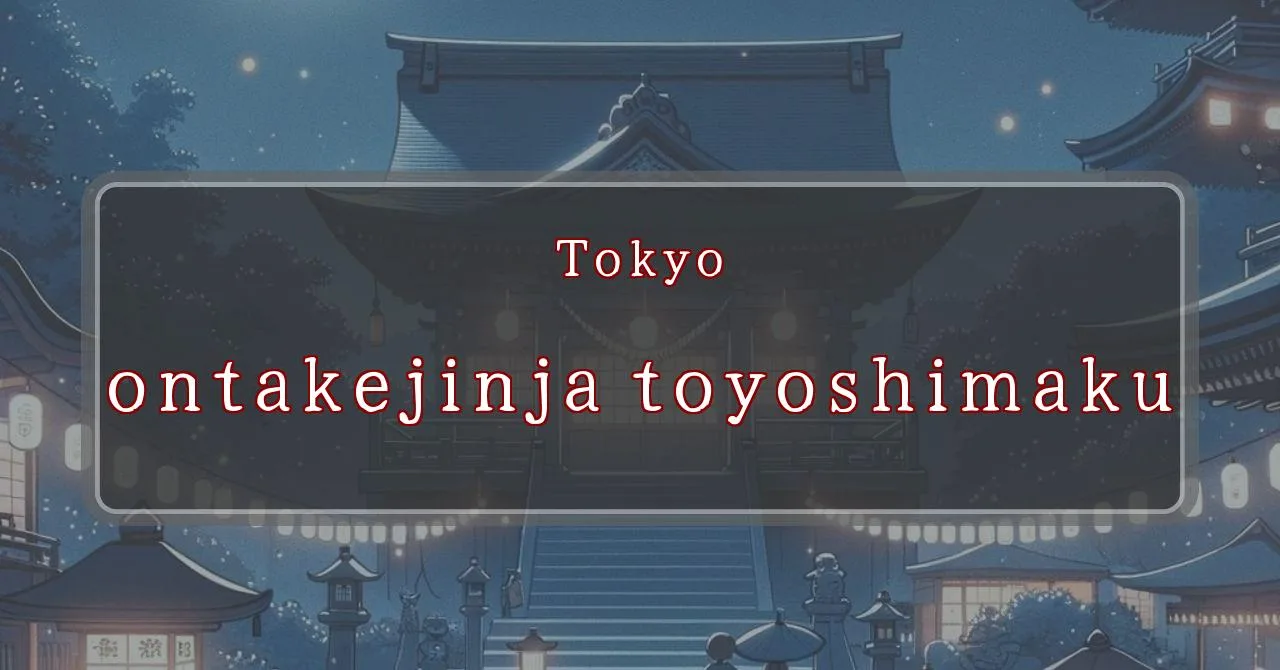Enchanting Shrine Festival in Tokyo: A Journey Through History and Tradition
Basic Information
Ikebukuro Mitake Shrine is a shrine located in Toshima Ward, Tokyo, Japan. It is the tutelary deity of the Ikebukuro Nishiguchi area.
- Address: 3-51-2 Ikebukuro, Toshima-ku, Tokyo 171-0014
- Phone Number: 03-3971-8462
- Access: 12-minute walk from JR Ikebukuro Station West Exit (Central Exit), 8-minute walk from C3 Exit, 14-minute walk from Yurakucho Line/Fukutoshin Line Motoyawata Station
- Festival Days: September 28th (Sat), September 29th (Sun), 2024
Main Events and Attractions of the Festival
The Ikebukuro Mitake Shrine Festival is a two-day annual event held on the fourth Saturday and Sunday of September. It features a variety of traditional Japanese cultural performances and activities, as well as food stalls and games.
Mikoshi Procession
One of the main highlights of the festival is the mikoshi procession, where portable shrines are carried through the streets of Ikebukuro by local residents. The mikoshi are elaborately decorated and weigh several hundred kilograms, and the procession is a lively and colorful spectacle.
Kagura Performance
Kagura is a traditional Japanese Shinto ritual dance and music performance. During the festival, kagura performances are held at the shrine’s honden (main building), and visitors can watch the dancers and musicians perform.
Bon Odori Dance
Bon Odori is a traditional Japanese folk dance performed during the Obon festival, which is a time to honor the spirits of the deceased. During the Ikebukuro Mitake Shrine Festival, Bon Odori dances are held in the shrine’s境内 (境内), and visitors can join in and learn the steps.
Food Stalls and Games
The festival also features a variety of food stalls selling traditional Japanese festival foods, such as yakisoba (fried noodles), takoyaki (octopus balls), and kakigori (shaved ice). There are also games and activities for children, such as goldfish scooping and ring toss.
Blessings and Deities
Ikebukuro Mitake Shrine is dedicated to three deities: Yamato Takeru no Mikoto, Jimmu Tenno, and Take Mikazuchi no Mikoto. Yamato Takeru no Mikoto is a legendary hero from Japanese mythology, known for his bravery and skill in battle. Jimmu Tenno is the first emperor of Japan, and Take Mikazuchi no Mikoto is the god of thunder and lightning.
- Yamato Takeru no Mikoto: Legendary hero known for bravery and skill in battle
- Jimmu Tenno: First emperor of Japan
- Take Mikazuchi no Mikoto: God of thunder and lightning
Origin and History
The origins of Ikebukuro Mitake Shrine are unclear, but it is believed to have been founded during the Tensho era (1573-1592). The shrine was originally known as Mitake Shrine, but its name was changed to Ikebukuro Mitake Shrine in 1938. The shrine has been a popular place of worship for local residents for centuries, and it is also a popular tourist destination.
- Founded: Tensho era (1573-1592)
- Original name: Mitake Shrine
- Renamed: Ikebukuro Mitake Shrine in 1938
Tips and Notes for Visitors
If you are planning to visit Ikebukuro Mitake Shrine during the festival, here are a few tips and notes to keep in mind:
- The festival is very popular, so it is best to arrive early to avoid crowds.
- Wear comfortable shoes, as you will be doing a lot of walking.
- Bring a camera to capture the sights and sounds of the festival.
- Be respectful of the shrine and its customs.
Parking Information
There is limited parking available at Ikebukuro Mitake Shrine. If you are driving, it is best to arrive early to secure a parking spot. There are also several public parking lots located near the shrine.
- Limited parking available at the shrine
- Arrive early to secure a parking spot
- Public parking lots located near the shrine
Popular Stalls and Food Carts in Recent Years
| Type of Stall | Description |
|---|---|
| Takoyaki | A staple at Japanese festivals. Characterized by a crispy outside and a creamy inside. |
| Jaga Butter | A simple yet popular snack of hot potatoes lavishly topped with melted butter. |
| Baby Castella | Small castella cakes, sweet and fluffy treats enjoyed by children and adults alike. |
| Grilled Ayu with Salt | Fresh ayu fish grilled whole with salt, a savory taste of Japanese summer. |
| Shaapin | A unique gourmet item influenced by foreign cuisine, with a chewy skin wrapping the filling. |
| Okonomiyaki | A Japanese grilled dish where you often choose your own ingredients for a personalized flavor. |
| Cotton Candy | A fluffy, sweet snack that’s extremely popular with children. |
| Chocolate Banana | A banana coated in chocolate, a fun and visually appealing dessert. |
| Kushiyaki | Various types of ingredients skewered and grilled, an easy-to-enjoy snack. |
| Yakisoba | Fried noodles mixed with a special sauce, a fast food favorite in Japan. |



